|
|
|
Sort Order |
|
|
|
Items / Page
|
|
|
|
|
|
|
| Srl | Item |
| 1 |
ID:
141250
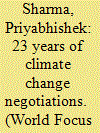

|
|
|
|
|
| Summary/Abstract |
Over the decades, climate change has emerged as an established wisdom of contemporary times. This has happened merely in the span of last three decades. Prior history of the science of climate change was full with controversy and debate. When at the turn of the nineteenth century the Swedish chemist Svante Arhenius (1896) proposed this hypothesis for the first time that man-induced carbon dioxide in the atmosphere of earth would lead to an increase in surface temperature through the greenhouse effect, not many took him seriously. To believe that the climate of earth was changing at a pace and scale far greater than the routine characteristic change forming part of the geological history of earth was too farfetched a contention at that time. For about next half a century as a result of some evidence it came generally to be agreed upon that some sort of climate change was happening but it still remained largely unclear whether this change had been happening in the direction of global cooling or that of global warming.
|
|
|
|
|
|
|
|
|
|
|
|
|
|
|
|
| 2 |
ID:
110803


|
|
|
|
|
| Publication |
2012.
|
| Summary/Abstract |
This article examines the effect of climate change on a type of armed conflict that pits pastoralists (cattle herders) against each other (range wars). Such conflicts are typically fought over water rights and/or grazing rights to unfenced/unowned land. The state is rarely involved directly. The rangeland of East Africa is a region particularly vulnerable to drought and livestock diseases associated with climate change. To analyze the possible effects of climate change on pastoral conflict, we focus our analysis on changes in resource availability, contrasting cases of abundance and scarcity. The role of resources is further contextualized by competing notions of property rights, and the role of the state in defining property and associated rights. We employ a contest success function (CSF) game-theoretic model to analyze the logic of range wars. This CSF approach emphasizes the low-level, non-binary nature of raiding behavior between pastoralist groups over limited natural resources. A central contribution of this approach is that the logic of raiding behavior implies a positive relationship between resources and conflict. This positive relationship is supported by several studies of the rangeland of East Africa, but is generally dismissed by the literature on the 'resource curse'. This relationship is contingent on other factors examined in the model, producing the following results. First, the level of property rights protection provided by the state generally reduces conflict between pastoralist groups. Second, if property rights protection is provided in a biased manner, then conflict between pastoralist groups increases. Third, severe resource asymmetries between two pastoralist groups will induce the poorer group to become bandits (focusing their efforts on raiding and not producing), while the richer group raids in retaliation.
|
|
|
|
|
|
|
|
|
|
|
|
|
|
|
|
| 3 |
ID:
141249
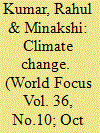

|
|
|
|
|
| Summary/Abstract |
The issue of climate change is one of the most vehemently debated topics in the national and international domain and it has its impact in almost all sectors of human existence, be it on health, economy, and environment and so on. According to United Nations Framework Convention on Climate Change (UNFCCC), change in climate is in one way or the other linked with human activity. It defines climate change as the change that can be attributed “directly or indirectly to human activity that alters the composition of the global atmosphere and which is in addition to natural climate variability observed over comparable time periods” A slightly different approach is adopted while defining climate change by Intergovernmental Panel on Climate Change (IPCC). IPCC has defined climate change as “change in the state of the climate that can be identified by changes in the mean and/or the variability of its properties, and that persists for an extended period, typically decades or longer. It refers to any change in climate over time, whether due to natural variability or as a result of human activity.
|
|
|
|
|
|
|
|
|
|
|
|
|
|
|
|
| 4 |
ID:
141245
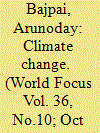

|
|
|
|
|
| Summary/Abstract |
There is no need to emphasize the fact that the climate change crisis is a major global challenge of our times. However, the climate change crisis is insurmountable, once it crosses the threshold. It threatens not only our present generations but also the future of entire humanity. The impacts of climate change, once set in, are not reversible in the short run. The assessment of the global warming trends and their likely adverse consequences is made by the Inter-Governmental Panel on Climate Change in its five Assessment Reports published respectively in the years 1990, 1996, 2001, 2007 and 2014. The gist of these reports is that the global mean temperature has increased by 0.3 to 0.6 degree centigrade in last 100 years but it is likely to increase by 0.3 C per annum in 21st century. The Synthesis Report of the Fifth Assessment Report (IPCL: 2014) remarks, 'Continued emission of greenhouse gases will cause further warming and long-lasting changes in all components of the climate system, increasing the likelihood of severe, pervasive and irreversible impacts for people and ecosystems'.
|
|
|
|
|
|
|
|
|
|
|
|
|
|
|
|
| 5 |
ID:
141246
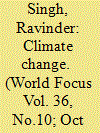

|
|
|
|
|
| Summary/Abstract |
Climate Change is a serious global environmental concern. It is primarily caused by the building up of Green House Gases (GHG) in the atmosphere. The global increases in carbon dioxide concentration (CO2) are primarily due to fossil fuel use and due to agriculture land use change yielding the methane and nitrous oxide. Global Warming is a specific example of the broader term “Climate Change”. It refers to the observed increase in the average temperature of the air near earth’s surface and oceans in recent decades. It is adversely affecting particularly the developing countries because they have neither the capacity nor the resources to deal with this challenge threatening the human existence (1). Scientific studies have proved the global atmospheric concentrations of most important Green House Gases-carbon dioxide (CO2), methane (CH4) and nitrous oxide (NO2) have increased markedly due to human activities since 1750.
|
|
|
|
|
|
|
|
|
|
|
|
|
|
|
|
| 6 |
ID:
141247
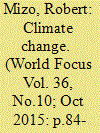

|
|
|
|
|
| Summary/Abstract |
Climate change warrants committed action from governments. No nation can afford to ignore the issue any longer given the ripening science behind it and the growing international attention. China and India have been under keen spotlight in the arena of international climate politics. This is because the two countries are major developing economies with rising emissions rates comparable to those of the developed west.[1] China and India share varied challenges emanating from the climate problem because they have to simultaneously grapple with issues typical to the third world. As developing economies, the two nations have to address the calls of human security, poverty, unemployment, development, etc. Addressing the problem of climate change is bound to shape how these countries plan to grow and develop in the future. In charting out their responses to climate change as developing countries with unique national circumstances, China and India have adopted certain ideational principles.
|
|
|
|
|
|
|
|
|
|
|
|
|
|
|
|
| 7 |
ID:
141236
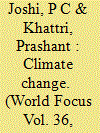

|
|
|
|
|
| Summary/Abstract |
The present article tries to locate the climate change diplomacy and politics within the larger framework of history and culture. Historical roots of climate change diplomacy are linked with scientific discoveries and a North-South geo-political binary. The climate change diplomatic negotiations are located within the backdrop of cultural theory and grand narratives of different geographical spaces. Broadly there are three cultural narratives regarding climate change that originate at different places and attribute different causes for climate change and hence float different solutions to tackle the problem. The contemporary mantra for a climate deal should be an integration of various narratives and stories rather than the competition of claiming one or the other as the main narrative and ignoring the other.
|
|
|
|
|
|
|
|
|
|
|
|
|
|
|
|
| 8 |
ID:
141243
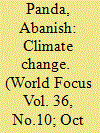

|
|
|
|
|
| Summary/Abstract |
Climate change is the result of global warming, which in turn is due to burning fossil fuels for steam and electricity generation. Accumulation of anthropogenic carbon dioxide in the earth atmosphere causes greenhouse effect. Disastrous consequences are melting of glaciers, snow and ice sheets, rise in sea level, changes in rainfall pattern, frequent extreme weather events, heat waves, droughts, flash floods, yield loss of crops, ocean acidification, loss of biodiversity, land inundation, etc. Mitigation methods are fuel switching to renewable energy sources such as wind, solar, biomass and nuclear for energy generation. With the new mandate of Obama administration to switch over to renewables of coal based power plants in the US, the difference in appropriate response to climate change between Europe and North America will recede. This, if implemented, would usher a new lease of hope for the present and future generations.
|
|
|
|
|
|
|
|
|
|
|
|
|
|
|
|
| 9 |
ID:
141252
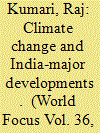

|
|
|
|
|
| Summary/Abstract |
Climate change is one of the main environmental challenges facing the world today. India is facing several problems. Climate change is associated with various adverse impacts on agriculture, water resources, forest and biodiversity, health, coastal management and increase in temperature Climate change would represent additional stress on the ecological and socioeconomic systems that are already facing tremendous pressure due to rapid industrialization, urbanization and economic development. This paper analyzes the efforts made by government of India to reduce the environmental challenges.
|
|
|
|
|
|
|
|
|
|
|
|
|
|
|
|
| 10 |
ID:
141255
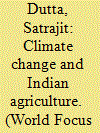

|
|
|
|
|
| Summary/Abstract |
Greenhouse effect is a natural process that produces the relatively warm and hospitable environment near the earth’s surface where humans and other life-forms have been able to develop and prosper. It is about non-normal variations to the climate mainly due to increased anthropogenic activities such as industrialisation, urbanisation, deforestation, agriculture, change in land use pattern etc. that leads to emission of increased level of green house gases (GHGs- carbon dioxide (CO2), water vapor (H2O), methane (CH4), nitrous oxide (N2O), hydrofluorocarbons (HFCs), perfluorocarbons (PFCs), and sulfur hexafluoride (SF6) etc.) which makes the rate of climate change much faster and so also its effects on Earth. The risk of climate change is largely a function of total cumulative GHGs in the atmosphere.
|
|
|
|
|
|
|
|
|
|
|
|
|
|
|
|
| 11 |
ID:
171749
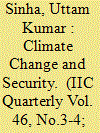

|
|
|
| 12 |
ID:
141235
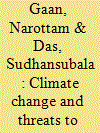

|
|
|
|
|
| Summary/Abstract |
What has rendered realist and neo-realist paradigm of security premised on state and its corresponding institutions redundant is the climate change. The source of security threats no longer lies with the state. The debate over the direct connection between climate change and security harks back to the day security threats were outsourced to non-military and non-traditional elements. There are skeptics who maintain that climate factors will only marginally influence tomorrow’s security environment, if at all. They point to significant natural fluctuations in climate patterns and short-term cyclical phenomena like El Nino and the recently identified Pacific Decadal Oscillation, the causes of which are not fully understood and deciphered. In their opinion, even if global warming does take place, many of its effects may be localized, benign or favourable.
|
|
|
|
|
|
|
|
|
|
|
|
|
|
|
|
| 13 |
ID:
141244
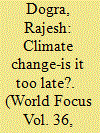

|
|
|
|
|
| Summary/Abstract |
The exact amount of climate change that is caused by human activities is not clear. However, it is clear that increasing greenhouse gas emissions result in warmer global temperatures and those human activities produce greenhouse gases. While climate change may not be caused by human activities alone, it is very likely that the changes observed during the last 50 years are not simply the result of natural causes. Is it too late to become part of the solution? No. We already have the knowledge and tools to start making changes.
|
|
|
|
|
|
|
|
|
|
|
|
|
|
|
|
| 14 |
ID:
141238
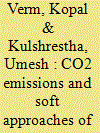

|
|
|
|
|
| Summary/Abstract |
During the last five years, India has achieved to become world’s ninth largest economy with a real GDP growth of 8.7% which is exceptional evidence of the growth of Indian economy [Energy Statistics, 2013]. Such a high economic growth involves enormous pressure on the energy resources of the country resulting in increased demand and supply imbalance across all energy sources. India’s energy basket has mixture of all the resources with the dominance of coal [Energy Statistics, 2013]. Being the capital of India, Delhi is the hub of opportunities for all including youth, entrepreneurs, governments, and the directly or indirectly associated people. This catalyses the processes of migration which is responsible for the growth of population, size of the urban area and industrialization [Aggarwal and Jain, 2014]. This further leads towards increased energy consumption posing serious environmental and human health threats. The worsening air quality of the city is triggering various respiratory problems such as chronic bronchitis, lung cancer and infections etc. Adverse air quality also affects visibility and climate, most of the time making irreversible changes. One such example is climate change which is difficult to cope by `hard’ mitigating methods due to human desires and geographical competitiveness for modern development. Due to these reasons many people believe that our climatic conditions will never be restored into the original form and adaptation is the only option for future generation. However, it is possible to reduce greenhouse gases (GHG) and carbon emissions by `soft’ techniques. Taking into account the consumption of fossil fuels by different sources and their emissions in Delhi National Capital Region (NCR), this article focuses upon the soft approaches to mitigate (GHG) and carbon emissions.
|
|
|
|
|
|
|
|
|
|
|
|
|
|
|
|
| 15 |
ID:
141251
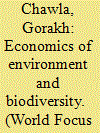

|
|
|
|
|
| Summary/Abstract |
A nation’s prosperity depends on its competitiveness, which is based on the productivity with which it produces goods and services. Economists and biodiversity conservationists tend to agree on one central point regarding the relationship between the economy and biodiversity, that the damage to biodiversity increases dramatically in the course of economic development until, at a certain level of wealth, opportunities for biodiversity conservation can potentially be improved. There is also strong agreement about the central importance of development for the eradication of poverty. Among its many other terrible effects, poverty is one of the major contributors to stress on biodiversity. Economists emphasize the contribution of economic growth to providing the resources needed for biodiversity conservation, improving access to environment friendly technologies, and, with increases in standard of living, providing the flexibility societies need to make biodiversity and development trade-offs more favorable to biodiversity conservation.
|
|
|
|
|
|
|
|
|
|
|
|
|
|
|
|
| 16 |
ID:
141242
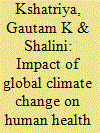

|
|
|
|
|
| Summary/Abstract |
Humans, for their survival, have always depended on the natural environment and their gradual cultural evolution incorporated in many activities had an impact on the biophysical environment, biodiversity and other resources. The activities of human beings frequently disrupted the balance of nature leading to ecological imbalances and environmental degradation. The transition phase began from hunters and gatherers to settling for agriculture to production of large-scale machine-made goods. A shift from dependence on renewable energy (wood) to non- renewable fossil fuels (coal, oil and natural gas) was observed. The changes to the climate due to natural factors and man-made factors have added on to the disastrous conditions leading to health impairment. Heat waves, storms, floods and environmental deterioration have led to unimaginable negative effects on agriculture, fisheries and infectious disease transmission.
|
|
|
|
|
|
|
|
|
|
|
|
|
|
|
|
| 17 |
ID:
141248
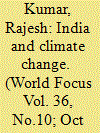

|
|
|
|
|
| Summary/Abstract |
In last few decades, there has been tremendous increase in culmination of several International Protocols and Agreements and exercises like the Copenhagen Summit, the Bali Summit, the Cancun Summit and followed by the Doha and Durban Summits in recent years, they all reflect the earnestness on part of the policy makers’ world over for clinching of a final deal on Climate Change related issues. Governments all over the world are under pressure to act in the larger interest of the humanity across the world because of ever increasing threats of Climate Change. Every time during the summits, expectations run very high that something concrete would emerge, but so far there have been only few outcomes and more promises so far been made by the countries for meeting again and committing themselves for sealing agreements one more time during forthcoming Paris 2015 meeting. Going by the past trends, serious apprehensions can be cast about any fruitful outcomes taking place any time in near future because of the serious differences countries and their governments have about achieving the targets and making cuts in emissions of Green House Gases (GHG) under different International Protocols on different pretexts at international as well as national level.
|
|
|
|
|
|
|
|
|
|
|
|
|
|
|
|
| 18 |
ID:
141253
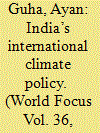

|
|
|
|
|
| Summary/Abstract |
India’s policy towards the issue of climate change at international negotiations seems to be equipped with both malleability and rigidity. There are certain aspects in which India’s international policy towards the issue has demonstrated significant capability to mould itself as per the changing dynamics of world politics. On the other hand, the core of the policy framework has shown considerable resistance to subject itself to modification and metamorphosis.
|
|
|
|
|
|
|
|
|
|
|
|
|
|
|
|
| 19 |
ID:
141240
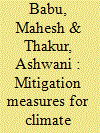

|
|
|
|
|
| Summary/Abstract |
Climate Change in general refers to changes that are identified in the weather patterns and persist for an extended period, usually for decades or longer. The change in the weather conditions are caused by many natural processes; however, in recent times certain human activities are identified as cause of the climate change. Climate change induced due to certain human activities is also referred to as Global Warming.
|
|
|
|
|
|
|
|
|
|
|
|
|
|
|
|
| 20 |
ID:
192919
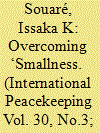

|
|
|
|
|
| Summary/Abstract |
Niger served on the Security Council in the period 2020–2021 and remained throughout its tenure an active player in its West African region on security issues. The government in Niamey also leveraged its moral high ground in the region, based on its experience of democratic transfers of power in presidential elections in early 2021. Niger had expertise on security challenges in one of the focus regions of the Council, the Sahel, while it also enjoyed a good geopolitical partnership with two permanent members of the Council, France and the US, thanks to earlier cooperation on counter-terrorism initiatives in the Sahel. This article empirically examines how Niger used these factors to show agency in overcoming apparent structural deficiencies to address its own security challenges and promote aspects of the African Peace and Security Architecture.
|
|
|
|
|
|
|
|
|
|
|
|
|
|
|
|
|
|
|
|
|